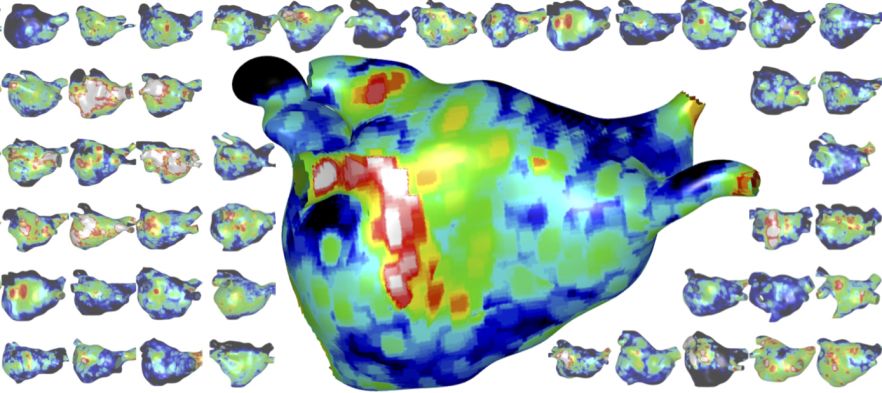£9,318,011
Centre for Bioengineering
Funded Research Projects
The following are current funded research projects taking place within the research centre:
Building the gut microbiomePrincipal Investigator: Funding source: EPSRC Start: 01-11-2023 / End: 31-10-2028 Amount: £1,729,528 Bacteria hugely impact many aspects of our lives, including health, agriculture, industry, water treatment services, and the climate. Often, they live together in densely packed communities, where they can strongly interact with each other. In particular, the 'bacterial communities' living in our digestive tract are now known to be essential for our health and well-being, such as protecting us from harmful bacteria, improving our nutrition, and training our immune systems. Critically, changes in the community composition and structure can lead to chronic and life-threatening diseases. Therefore, we must understand how these bacteria interact with each other and ourselves if we want to unlock further health benefits available to us. However, it is extremely difficult to study and understand these bacterial communities, especially at the tiny scales at which they naturally occur. New methods are urgently needed to build simplified bacterial communities and their hosts, capturing the complex arrangements and interactions of different bacteria found within us. My goal is to build new tractable models - using 3D printing and flow systems - to study how the composition and structure of the community and the host determine how bacterial communities persist over time, and importantly, if they thrive or perish. I have chosen to work in this research area because I believe I can vastly improve our understanding of the link between the host, community structure, and community function by building simplified microbiome models. Importantly, the technologies and understanding I develop throughout this proposal will not only benefit human microbiome research, but microbial communities found throughout the environment. |
Extreme heat and preterm birth in rural zimbabwePrincipal Investigator: Andrew Prendergast Co-investigator(s): Tina CHOWDHURY Funding source: Wellcome Trust Start: 01-09-2023 / End: 31-08-2028 Amount: £1,824,053 This project is funded by Wellcome and led by Prof Andrew Prendergast who is the Director of the Zvitambo Institute for Maternal and Child Health Research in Zimbabwe and has established clinical trials to improve healthy birth and growth. Our goal is to better understand the pathogenesis of preterm birth which affects 13.4 million babies each year, making it the leading cause of death amongst children under five years old. The project involves a transdisciplinary team of UK-Zimbabwe academics working towards understanding the complex interactions of how extreme heat affects pregnancy and preterm birth. Zimbabwe has one of the highest global preterm birth rates (32/1000 live births). Currently, there is a paucity of clinical interventions to prevent preterm birth in rural Zimbabwe. The team has developed a human 3D microengineered model representing the maternal-fetal interface to investigate the effects of heat stress on inflammatory and mechano-immune mechanisms. Clinical biomarkers identified in pregnant women who live in Zimbabwe will be investigated in vitro to discover whether extreme heat propagates and amplifies inflammation, impacting the integrity of the fetal membranes, leading to their rupture and preterm birth. ** |
AI-guided Prostate BiopsyPrincipal Investigator: Zion TSE Funding source: Start: 01-06-2022 / End: 28-02-2028 The AMS Professorship will enable the team to clinically validate next-generation interventional technology for affordable image fusion with a small footprint and translate it to clinical practice. The team's planned project, a collaboration between his lab and Addenbrooke’s Hospital, will aim to improve freehand transperineal prostate cancer biopsy by developing an integrated 3D MRI-US image fusion system built upon state-of-the-art AI techniques. This system will help clinicians precisely navigate needles to lesions in the prostate for more effective diagnosis and treatment. |
The role of novel mechanosensitive complex in cardiomyocyte pathophysiologyPrincipal Investigator: Thomas ISKRATSCH Funding source: BHF British Heart Foundation Start: 01-10-2024 / End: 30-09-2027 Amount: £285,532 |
Preterm birth mechanisms in a high HIV prevalence setting in rural ZimbabwePrincipal Investigator: Andrew Prendergast Co-investigator(s): Tina CHOWDHURY and Stefaan VERBRUGGEN Funding source: MRC Start: 01-05-2024 / End: 30-04-2027 Amount: £1,283,831 Every year, 13 million babies are born too soon. Preterm babies have a higher risk of dying or developing less well. Preterm birth is particularly common in Africa, where HIV infection during pregnancy increases the risk of preterm birth. Infection and inflammation may cause preterm birth by weakening the membranes and triggering the start of labour. We believe pregnant women with HIV have more infections and inflammation which increases their preterm risk. Our project aims to understand why babies are born preterm in Zimbabwe and whether an inexpensive antibiotic can reduce infections and inflammation. Overall, we hope to understand how bacteria and immune responses aect the risk of preterm birth in Africa, and explore whether antibiotics reduce preterm birth. We will work in partnership with the Zimbabwean Ministry of Health and Child Care to disseminate our findings to people in the rural community where the trial was done, and to policymakers who write guidelines about how to prevent preterm births. ** |
Talin dependent mechanical imprinting as driver for cardiac disease progressionPrincipal Investigator: Thomas ISKRATSCH Funding source: BHF British Heart Foundation Start: 08-01-2024 / End: 07-01-2027 Amount: £718,167 |
Scalable Manufacturing of Single-Crystal Perovskite Optical and Electronic Devices: Follow-OnPrincipal Investigator: Lei SU Co-investigator(s): Oliver FENWICK and Colin CRICK Funding source: EPSRC Engineering and Physical Sciences Research Council Start: 01-12-2023 / End: 30-11-2026 Amount: £941,955 In this project, we will develop technologies for scalable manufacturing of single-crystal perovskite optical and Electronic Devices. |
Mapping populations to patients: designing optimal ablation therapy for atrial fibrillation through simulation and deep learning of digital twinPrincipal Investigator: Caroline RONEY Funding source: UKRI Medical Research Council Start: 01-11-2022 / End: 31-10-2026 Amount: £1,224,259 We will combine biophysical simulation and deep learning methods with a longitudinal digital twin approach to optimise risk prediction and choice of therapy for atrial fibrillation. We aim to move predictions from the acute response to the long-term response; from the average patient to an individual patient; from standard treatments to any treatment approach; from small patient cohorts to large virtual trials; and from long simulation times to short clinical timescales.** |
Engineered Recombinant Strategies to Organogel Design for Food Product FormulationsPrincipal Investigator: Julien GAUTROT Funding source: Motif Food Works Inc Start: 01-09-2022 / End: 31-08-2026 Amount: £32,500 |
Integrated Human-Augmented Robotics and Intelligent Sensing Platform for Precision ViticulturePrincipal Investigator: Ketao ZHANG Co-investigator(s): Lei SU Funding source: Innovate UK Start: 01-09-2023 / End: 31-08-2026 Amount: £297,599 This project aims to revolutionize the way high-value horticultural crops such as grapes, berries, and other fruits are grown by developing and implementing a precision farming ecosystem. |
Development and Validation of Smartphone-Based Tools for Characterisation of GaitPrincipal Investigator: Caroline RONEY Co-investigator(s): Zion TSE Funding source: Start: 10-04-2024 / End: 09-04-2026 This project aims to develop and validate smartphone-based tools for characterising gait. By utilizing the sensors and capabilities of modern smartphones, the project seeks to provide accessible, accurate, and cost-effective solutions for gait analysis, benefiting both healthcare providers and researchers in diagnosing and monitoring gait-related conditions. |
Development of an Organ-on-a-chip model of polycystic kidney disease using CRISPR modified human kidPrincipal Investigator: Martin KNIGHT Funding source: Kidney Research UK Start: 01-12-2023 / End: 30-11-2025 Amount: £39,986 |
Tomo-SAXS: Imaging full-field molecular-to-macroscale biophysics of fibrous tissuesPrincipal Investigator: Himadri GUPTA Funding source: EPSRC Engineering and Physical Sciences Research Council Start: 01-01-2021 / End: 25-10-2025 Amount: £451,556 This project will combine X-ray phase-contrast tomographic imaging and small-angle X-ray scattering to develop a path-breaking new technique - TomoSAXS – for the multiscale biophysics of tissues. We will develop advanced reconstruction algorithms to generate full-field 3D images of molecular to macroscale soft tissue structure, using the intervertebral disc as a prototypical organ. Full details: https://gow.epsrc.ukri.org/NGBOViewGrant.aspx?GrantRef=EP/V011235/1** |
G1F1 Application of a new high throughput platform for validation of mechanosensitive miRNAPrincipal Investigator: Rob KRAMS Co-investigator(s): Funding source: BHF British Heart Foundation Start: 03-10-2022 / End: 02-10-2025 Amount: £117,986 |
Designing motile and chemotactic protocells and exploit cellular collective behavioursPrincipal Investigator: Funding source: BBSRC Biotechnology and Biological Sciences Research Council Start: 02-01-2023 / End: 30-09-2025 Amount: £371,059 |





